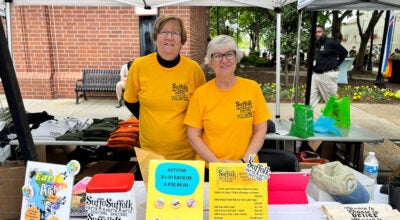Mobile phones on hold
Published 10:47 pm Friday, February 15, 2013
The Suffolk School Board stalled Thursday when asked to allow students to use their mobile phones in classrooms for educational purposes. Instead it asked King’s Fork High School Principal Suzanne Rice to return mid-year with firmer evidence that the devices enhance instruction.
Students at the school have been using cellphones for educational purposes, at the discretion of teachers, since the beginning of the school year. While teachers guide the practice, mostly limiting it to things like looking up definitions and online quizzes, students can listen to music or play games during transition or in the cafeteria.
Former vice chair Thelma Hinton brought the activities at King’s Fork High to the board’s attention last September, when members approved a one-month pilot study, which was later extended.
On Thursday, board members were asked to officially authorize continuing the “pilot program” indefinitely and to alter district regulations accordingly.
But several board colleagues raised concerns, despite Rice and a procession of teachers, students and parents testifying how the devices have revolutionized classrooms. Chairman Michael Debranski suggested a new plan to again extend the pilot temporarily.
“We just want to hear some evidence,” Debranski said.
Board members unanimously supported the new plan, seconded by Enoch Copeland, which would have Rice return before the board in August with proof that cellphones are actually helping students’ test scores and aren’t just anecdotally popular.
Rice’s argument runs that mobile electronic devices — the school’s experiment also includes iPads and other portable technology — are “part of our lives and we want to make them a huge part of … education as well.”
She presented evidence that cellphone incidents have fallen steadily since the devices were de facto legalized. Banning students using electronic devices is “futile,” she said.
At one point during the meeting, to demonstrate the educational power of cellphones, Rice encouraged everyone in the room take out their own devices and join in a quiz using www.socrative.com.
“Overall, it has made my class more efficient and productive,” said art teacher Sarah Whitelock, whose students use their cellphones to listen to music while working on projects, as well as to take pictures.
But Copeland suggested that a more random canvassing of the Bulldog community might actually turn up resistance.
Judith Brooks-Buck was concerned about the impact on students without access to mobile technology — they’re supplied with laptops, and homework can also be competed manually as well as electronically, Rice responded – and Linda Bouchard raised the prospect of students using their phone-based cameras inappropriately.
“If somebody wants to take a picture of it, it will be taken,” whether or not camera phones are banned, Rice said.
“We have heard some very compelling statements, but I haven’t seen any evidence,” Debranski concluded.
“I’d certainly like to see the proof in the pudding before we give it our blessing.”






